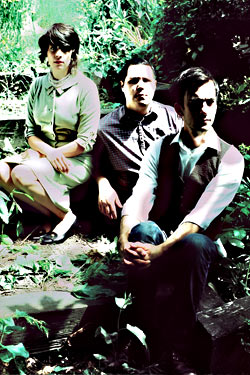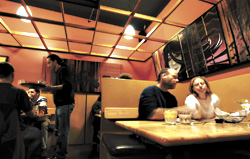“I have all these jobs because they allow me to play music,” says a dark-haired, dark-eyed Eric Fisher, on a quick coffee break from taking down an entire show from the walls of unique Ballard Avenue art gallery OKOK. As a member of singer-songwriter Damien Jurado’s band for the past six years, he’s juggled jobs that grant him flexibility to record and tour but that also tap into his artistic sensibilities. OKOK is the primary source of flow; he handles the graphic design, Web site, and technical aspects of the business, as well as odd jobs, such as putting up and taking down shows. “It doesn’t feel like work,” he says of the time he spends at the gallery. “[OKOK curator] Charlie [Kitchings] is a great friend, and I really like what he does.” Fisher also co-owns an independent clothing and accessories line called Puckish that features his original designs screen-printed on casual wear like hoodies and tees as well as handbags. While he works part time at the gallery, and Puckish is still at a point that doesn’t go much beyond breaking even, Fisher does much of his freelance graphic-design work for trade (his latest project is for Sitka and Spruce owner Matt Dillon’s new Georgetown endeavor). Fisher is one of the few folks in his demographic to actually own a house in the city. “That’s one area where being a musician actually helped me,” he laughs, recalling the type of loan he qualified for—which, as a musician, didn’t require him to state his income. Before he hits the road again in September, he’ll also put in some time working on the house, tearing down and putting up walls, a skill he learned from another day job he once held: construction worker.
Day Job is a look at how musicians pay the rent.






